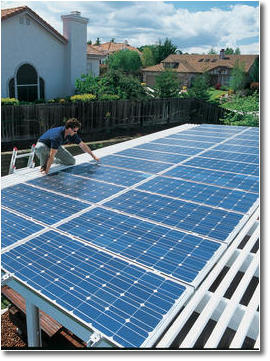
Image: NREL
 |
Solar PV could
become a common installation part of any new construction with the
amended SB 199, solar home initiative. Image: NREL |
"(Solar advocates are) concerned with establishing a vibrant solar
market in California so the Governor's programs would have support."
Sacaramento, California - August 23, 2004 [SolarAccess.com]
Legislators, industry officials and California's Governor are working hard to
get a solar homes bill before the state Legislature. Solar Homes Bill (SB) 1652,
authored by State Senator Kevin Murray, was written as a vehicle to provide
funds for the installation of solar electric systems on new homes built in
California. The Senate and the California Housing Committee passed SB 1652, but
the Assembly Appropriations Committee defeated the bill as it was written.
Governor Arnold Schwarzenegger did not endorse the original bill, but has
proposed some amendments to create SB 199. The draft of SB 199 has a list of
changes that could help it pass through all of the legislative steps.
Amendment overview:
Added language:
A mandate would begin in 2008, and require developers to offer solar
photovoltaic (PV) systems on the construction of large developments.
The California Energy Commission (CEC) would compile a report on financing
options that could lower solar costs in the state and submit the report to the
legislature. Education outreach about PV systems for builders would also become
a CEC responsibility.
Proceedings by the California Public Utilities Commission (PUC) to establish
funding goals would begin on or before February 2005, and end by December 2007
to ensure adequate funding for the construction goal of 1 million solar homes by
2017.
Amended language:
SB 199 specifies how funding from the Emerging Renewable Resources Account is
distributed. The CEC would establish the conditions that would make a system
eligible for funds from the account, including system performance and energy
efficiency of the home. Residential projects that could apply for and secure
funding would have to have a 3 kW or less system installed, and all eligible
projects would have to use PV. System rebates would top out at $2.80 per W, and
annual rebates would decrease by 7 percent each year. An incentive for people
adding PV onto zero energy homes is also included in the statute amendment.
Funding relevant to SB 199 and collected from 2006 to 2012 would be immediately
available for the rebate structure.
The Emerging Renewable Resources Account would be renamed as the Solar Homes
Peak Procurement account, and any increases in the Public Good Fund will get
transferred to the peak procurement program with a baseline for funding
established by the Public Utilities Commission based on 2004 figures.
The net metering cap would be raised to 5 percent during peak load hours.
Jan McFarland, who is the executive director for the California Solar Energy
Industries Association, said she expects changes will be made to SB 199 over the
next few days. McFarland said she is most concerned with establishing a vibrant
solar market in California so the Governor's programs would have support, and
she would like to introduce amendments to the bill to ensure that market goal is
met.
Copyright © 1999 - 2004 - SolarAccess.com
Please visit www.solaraccess.com for great coverage on energy today!!